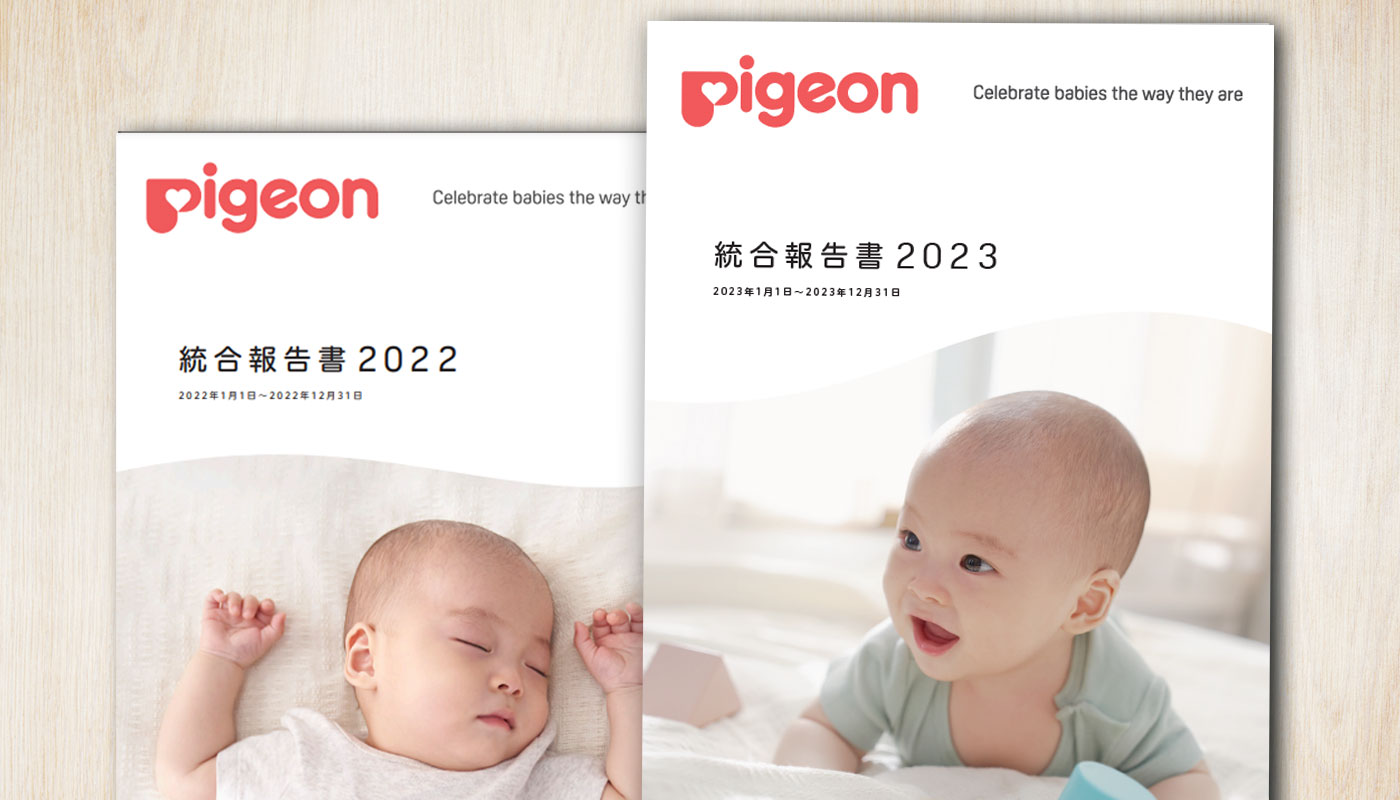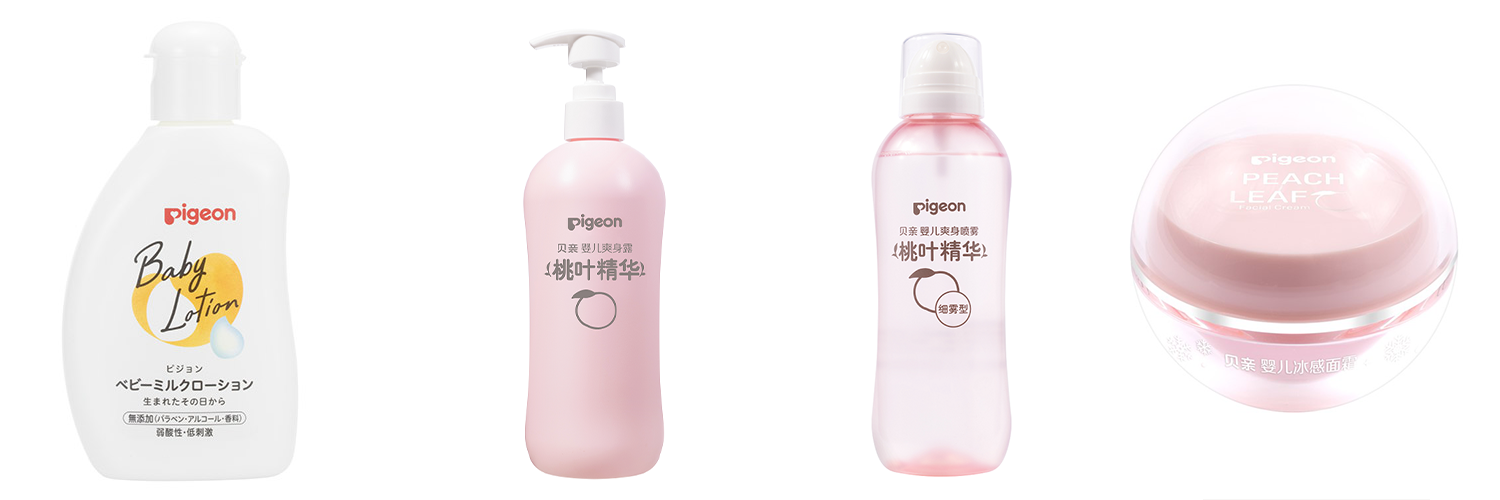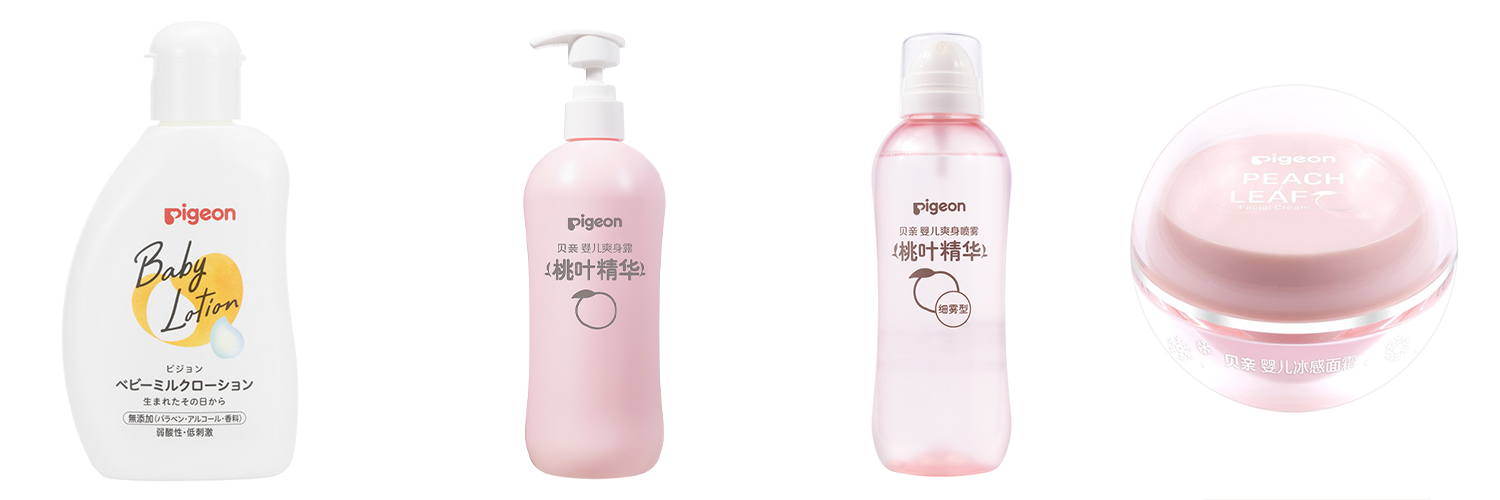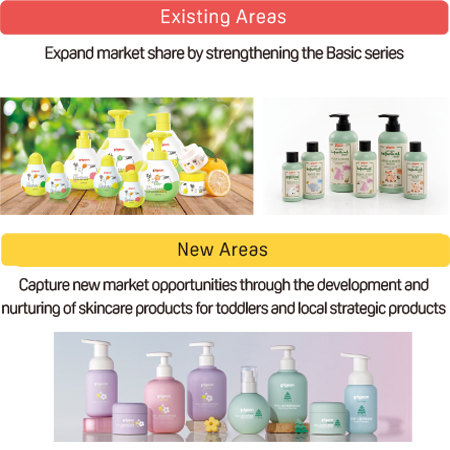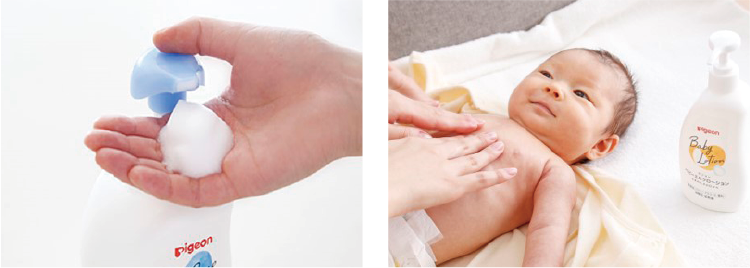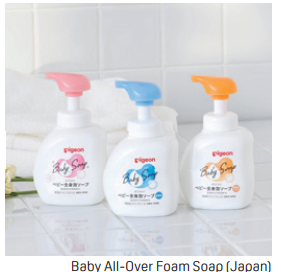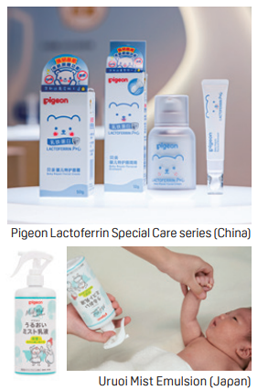Basic Approach・Strengths of the Pigeon Group・Skin Care Basic Policy
Pigeon began offering baby skincare products in 1974 and celebrated the 50th anniversary of its launch in 2024. Recognizing that a baby's skin is about half as thick as an adult's and highly sensitive to external irritants, we have continuously worked to understand and meet the needs of delicate baby skin over the past five decades.
While baby skin care is a growing market worldwide, it is a highly competitive category with many competing brands both globally and locally in each market. As of the end of 2022, our market share*1 in Japan is about 30%, and our market share*2 in China is about 10%, leaving ample room for further business expansion in all markets where we operate, including Japan and China. Although the current market share in the major countries overseen by the Singapore operation is small, we recognize that there are very promising growth opportunities for the future. We will enhance the presence of our brands by developing and rapidly launching high value-added product lineups that are backed by evidence and that provide optimal skincare for babies, tailored to the needs of each market.
The Pigeon Group has established research bases in Japan and China, where it has conducted basic research for decades focused on babies' skin. In addition to Japan and China, we have our own factory in Indonesia, and we are differentiating ourselves from our competitors by leveraging our knowledge and technologies in research and development for product commercialization and mass production. In addition to existing baby skincare products, we are focusing on skincare products as one of our key product categories, including the development of new area, kids' skincare products.
*1 According to our own research (Intage POS nationwide baby stores and drugstores combined expansion estimates)
*2 Share among our target customers, according to our own research
Specific initiatives and collaboration with external parties
A newborn babyʼs skin is about half the thickness of an adultʼs, making it more susceptible to external stimuli, while having a similar number of sweat glands to adults, which makes babies prone to sweating. In addition, from around three months of age, babies have less sebum to protect their skin from dryness, making them the most susceptible to dry, fl aky skin throughout their lifetime. It is well-known that many children develop atopic dermatitis, commonly known as eczema, during the period when their skin barrier is immature. Pigeonʼs baby skincare products are designed based on the mechanisms of a babyʼs skin health and development. Considering moisturizing capabilities and sensitivity, they are formulated to complement and nurture the healthy development of the skin barrier, aiding its growth and function. Moreover, in addition to ensuring quality and safety, we focus on customer satisfaction by considering factors such as ease of pumping, rinsing, and spreading, so that skincare does not become burdensome for parents.
Product Development Based on Research and Studies of Babiesʼ Skin (Japan)
In February and March 2024, based on a survey of expectant and new mothers regarding baby bathing habits and verification experiments designed primarily by dermatologists, we recommended a gentle washing method called Uruhada Arai (moist skin washing) that cleanses while replenishing ceramides—an essential component for baby skin hydration. The key points of this new skincare approach are choosing a body soap that contains ceramides and is “mildly acidic” and “low irritant,” and washing gently by wrapping the skin in foam without rubbing. Although ceramides are now widely recognized, Pigeon has been incorporating them into our products for nearly 30 years.Currently, we offer products containing an original moisturizing ingredient called Pigeon Natural Moisture*1, modeled after the naturally occurring moisturizing components in baby skin, particularly targeting the ceramide NP, which tends to be deficient in babiesʼ skin. We have also measured baby skinʼs actual pH, confirming its mildly acidic nature, and have adhered to mildly acidic formulations long before the term gained popularity. Our all-over body foam soap and foam shampoo generate fine, long-lasting foam that enables parents to wash their babies gently and thoroughly, even when bathing them alone.
*1 Moisturizing ingredients: Ceramide NP + Phytosteryl Isostearate
Products That Protect Babiesʼ Skin (Japan and China)
The Pigeon Group has established research and development divisions within each business unit to develop skincare products that reflect the specific needs of each country, delivering them to babies and their parents.
In 2024, we launched the Pigeon Lactoferrin Special Care series in China, featuring lactoferrin—a nutrient found in breast milk and formula—as the main ingredient. Lactoferrin has been found to improve the skinʼs barrier function at certain concentrations, suppress inflammatory factor secretion, reduce irritation, and moisturize baby skin.
In Japan, we introduced the Uruoi Mist Emulsion, a moisturizing mist that can be applied with one hand—even to active babies. The productʼs key feature is its ability to deliver quick moisturizing care: the mist can be sprayed directly onto wet skin in the bathroom and simply wiped with a towel to complete hydration. As a mist-type emulsion, a single spray is sufficient—thereʼs no need to spread it by hand—and it quickly blends with water and spreads across the skin. This convenience has been well received by parents, who say it helps reduce the burden of bathing their baby and older children alone.
Completion of Our Own Skincare Factory (Japan)
In 2023, Pigeon Home Products Corporation, which is responsible for manufacturing skincare products and other items, completed the construction of a new factory in Fuji City, Shizuoka Prefecture, consolidating its first and second factories, which were previously located separately. This consolidation aims to increase production effi ciency and profi tability. Also, expanding research-and-development facilities and increasing the number of development personnel serves to strengthen development capabilities. This will enable delving into new areas such as research on skin microbiota, collaborative research with universities, and the development of proprietary ingredients using plants sourced from Shizuoka Prefecture. The factory is open to the community, with tours for the public starting in April 2024, making it a venue for community engagement activities involving private organizations, government agencies, and others in the region. Explanations of the processes involved in completing a product, from development and manufacturing to inspection, as well as interactive exhibits where customers can enjoy learning about babies and childcare, enhance communication with customers, thereby boosting the brand presence in the baby skincare category and driving the growth of the category.
-
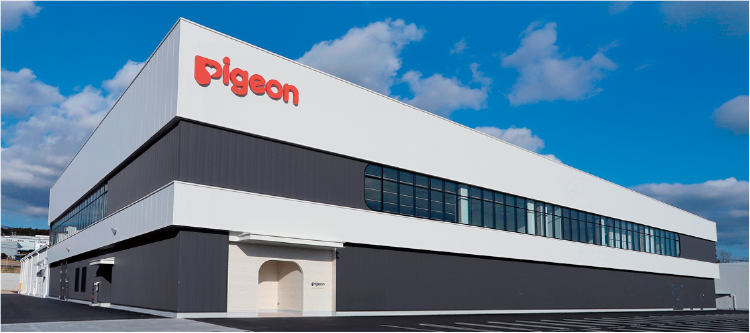
Pigeon Home Products Corporationʼs New Factory



